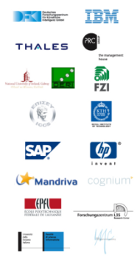NEPOMUK Deliverable D11.1: Mandriva Community Scenario Report
NEPOMUK Deliverable D11.1: Mandriva Community Scenario Report
| Mandriva Community Scenario Report | |
|---|---|
| Publication date (last release) | 01 February 2007 |
| Dissemination level | Public |
| Download links | D11.1_v12_NEPOMUK_Mandriva_Community_Scenario_Report.pdf D11.1_amendment_v11.pdf |
Executive Summary
The objective of WP11000 is the adoption, application and validation of the services provided by the Nepomuk platform in the context of the large on-line community of Mandriva Linux users.
This report presents a state of the art, a business case, a series of user requirements and of assessment criteria related to the case study. The reported work has been guided by the following methodology:
- the end users have been directly involved in the process of defining the scenarios and the requirements of the target system,
- a coordination task force bringing together all the case studies has made sure the findings are presented in a coherent manner,
- although the study focuses on the case of the Mandriva Linux community, the findings and the requirements remain generic enough for a potential reuse by other communities with similar needs.
Chapter 1 – "Introduction" – reminds the context and the objectives of the case study.
Chapter 2 – "State of the art on social semantic help desking" -– studies the adoption of the social Semantic Web vision and of social networking approaches through existing platforms devoted to knowledge sharing between users and experts.
Chapter 3 – "Business case for knowledge management improvement within the Mandriva Community" – outlines the business argument for adoption of Nepomuk technology by the Mandriva community and presents the adoption process. It also presents the new business activities Mandriva can derive from the system.
Chapter 4 – "User requirements" – presents findings resulting from interaction with the end users. It introduces personas representing the Mandriva Linux users, and defines a series of concrete user requirements derived from scenarios presenting the help desk at work.
Chapter 5 – "Case study domain ontologies" – presents the approach to work that will be adopted for drafting the domain ontologies. Several existing domain ontologies related to the case study are presented.
Chapter 6 – "Assessment Criteria" – describes the methodology for measuring the evolution of the case study both quantitatively and qualitatively. A key result derived from the literature review and from the Semantic Web initiatives conducted in the realm of life sciences, is that, to lower the drafting cost of the large domain ontologies required by the case study and to maximize their impact, the ontologies will be designed collectively using a semantic wiki favouring an open, parallel, decentralized, and synergistic protocol.
The report also emphasizes the need of a platform for sharing knowledge on free software not specifically related to a given Linux distribution: such a platform is likely to speed up the process producing a large amount of multi-lingual material organized in a semantic manner. It is envisaged to team up with the SELF EU project on this matter.
The study of existing knowledge sharing platforms has shown that one of the flaws of the current Mandriva help desk system is its lack of support for group forming. In providing the infrastructure for creating groups, Nepomuk services will let users take advantage of new paradigms for knowledge sharing and discovery such as "social search".
In collaboration with all other Nepomuk workpackages, WP11000 aims at delivering one of the "killer applications" of the Social Semantic Web.
As the knowledge sharing process is at the core of the production and innovation momentum of the Mandriva community, the effects of Nepomuk achievements in the context of WP11000 are potentially huge. WP11000 will ease dramatically the way end users can get precise answers to their questions, the help desk is likely not only to support the processes of the Mandriva Linux community, but also to have a tremendous impact on the adoption of Linux based systems on the desktop.

